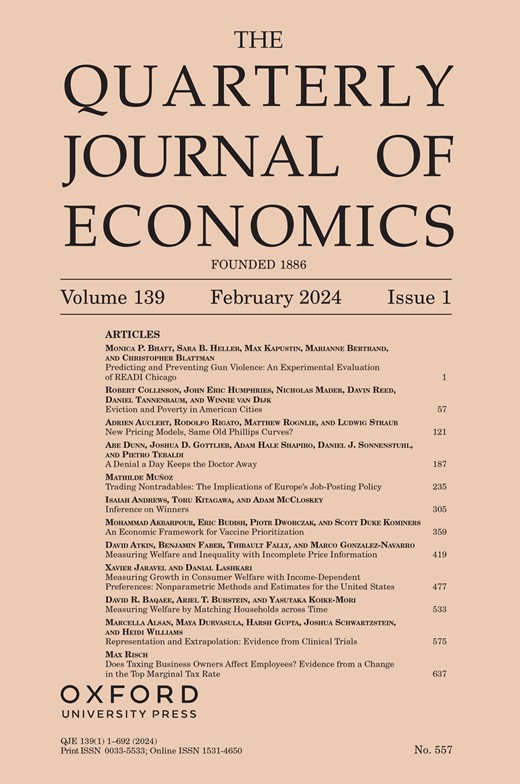政治广告和选举结果
IF 12.7
1区 经济学
Q1 ECONOMICS
引用次数: 119
摘要
我们研究政治广告的说服效果。我们的经验策略利用FCC法规,导致在相邻县的边界上的印象数量的似是而非的外生变化。将此方法应用于2004-12年总统竞选期间电视广告广播和观众模式的详细数据,我们的结果表明,政治广告总量对总投票率几乎没有影响。相比之下,我们发现广告对候选人的投票份额有积极的和有经济意义的影响。从表面上看,我们的估计表明,广告中的党派差异每增加一个标准差,投票份额的党派差异就会增加约0.5个百分点。来自回归不连续设计的证据表明,广告通过改变选民的党派组成来影响选举结果。本文章由计算机程序翻译,如有差异,请以英文原文为准。
Political Advertising and Election Results
We study the persuasive effects of political advertising. Our empirical strategy exploits FCC regulations that result in plausibly exogenous variation in the number of impressions across the borders of neighboring counties. Applying this approach to detailed data on television advertisement broadcasts and viewership patterns during the 2004–12 presidential campaigns, our results indicate that total political advertising has almost no impact on aggregate turnout. By contrast, we find a positive and economically meaningful effect of advertising on candidates’ vote shares. Taken at face value, our estimates imply that a one standard deviation increase in the partisan difference in advertising raises the partisan difference in vote shares by about 0.5 percentage points. Evidence from a regression discontinuity design suggests that advertising affects election results by altering the partisan composition of the electorate.
求助全文
通过发布文献求助,成功后即可免费获取论文全文。
去求助
来源期刊

Quarterly Journal of Economics
ECONOMICS-
CiteScore
24.20
自引率
2.20%
发文量
42
期刊介绍:
The Quarterly Journal of Economics stands as the oldest professional journal of economics in the English language. Published under the editorial guidance of Harvard University's Department of Economics, it comprehensively covers all aspects of the field. Esteemed by professional and academic economists as well as students worldwide, QJE holds unparalleled value in the economic discourse.
 求助内容:
求助内容: 应助结果提醒方式:
应助结果提醒方式:


